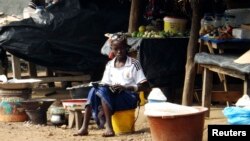Mabinty lives in a village in Guinea’s Boké region, about 250 kilometers northwest of Conakry, the capital.
Like much of Boké, Mabinty’s village has been covered in a film of red dirt.
A spring that once supplied fresh water to her village has been filled with thick mud. Nearby streams have dried up. The landscape, once green and brown, is now mostly rust-colored.
These are the effects of bauxite mining.
In Guinea, the bauxite business is booming. But the government, eager to grab a share of the global market, has done little to protect villagers and wildlife, Human Rights Watch concluded in a report published this month.
“The biggest problem of the past few years is (a) focus on growth and profit instead of environmental and social protection,” said Jim Wormington, a researcher in Human Rights Watch’s Africa division and the author of the bauxite report.
Mining officials dispute those findings, but all sides agree that the bauxite business has redefined Guinea’s export economy and reshaped large swaths of land, especially in Boké.
Rapid growth
Bauxite is the ore that makes aluminum. It’s used in everything from foil to cars and planes, a vital ingredient in manufacturing in the United States and, increasingly, China.
Since 2015, Guinea’s bauxite market has grown dramatically. When Indonesia and Malaysia banned bauxite mining in recent years, the Guinean government saw an opportunity, Wormington said.
They invited international mining companies to access their rich reserves, making the country the world’s third-biggest supplier of bauxite in 2017.
Once mined, ore needs to be moved from the countryside to ports for shipping. That’s led to an improved transportation infrastructure of roads and railways, Wormington told VOA.
The effects on those closest to the mining have, however, been decidedly negative, he said.
Bauxite mining is a messy process. The ore can be found just below topsoil, making it quick and easy to reach.
Accessing the ore, however, means moving mounds of clay-like earth, which end up in the air, in the water and across nearby land, covering pastures where animals graze. Once they unearth it, miners use dynamite to break up bauxite before transporting it.
Land deals
The impact on nearby villagers and the many subsistence farmers who live in the Guinean countryside has been profound, HRW found. Many Guinean farmers have traditional land rights. Without formal paperwork proving their ownership, they’re vulnerable.
“When mining companies come in, they come in with this extraordinary power, where the government has given them the right to land,” Wormington said.
A typical land deal involves a small, one-time cash payment to a local family or farmer. The payment isn’t enough to overly inconvenience the mining company, nor transform the life of the average Guinean.
Outdated findings?
La Société Minière de Boké (SMB), a consortium of companies that includes the world’s biggest aluminum producer, China Hongqiao Group, has become Guinea’s largest bauxite exporter, after just three years of operations.
In an interview with Guinéenews, an online news site focused on Guinea, Frédéric Bouzigues, the director general of SMB, said he appreciated HRW’s “open and constructive approach.” He took issue, however, with what he characterized as outdated and anecdotal findings.
“Most of the points raised in the study have been the subject of corrective actions for quite a long time,” Bouzigues told Guinéenews, speaking in French. Ongoing research should be conducted, he added, to determine whether mining companies are updating their practices in response to concerns.
Some of HRW’s findings may capture some residents’ realities, Bouzigues said, but they don’t “reflect the general opinion of the inhabitants of the area.”
Government responsibility
Frustrations with perceived government indifference to the consequences of bauxite mining led to riots last year in which several people were killed.
What’s most concerning from a sustainability standpoint, Wormington said, is how quickly bauxite mining has grown, and how much it might continue expanding. Last year, China and Guinea agreed to a deal to send $20 billion in bauxite to China over the next two decades.
The situation could deteriorate quickly, if steps aren’t taken to balance profits with sustainable development.
“It is primarily the government’s responsibility, not companies, to protect communities from the impacts of mining,” Wormington said.
Discussions are under way in China about the need to develop sustainable development practices, both by Chinese companies and regulators. But China is one of many players mining in Guinea, and it’s ultimately up to the Guinean government, Wormington said, to protect its people.
“The companies themselves should be doing so, but really the obligation is on the government itself to regulate the sector effectively,” he said.
SMB and Guinean government officials did not respond to VOA’s requests for comment before publication.








